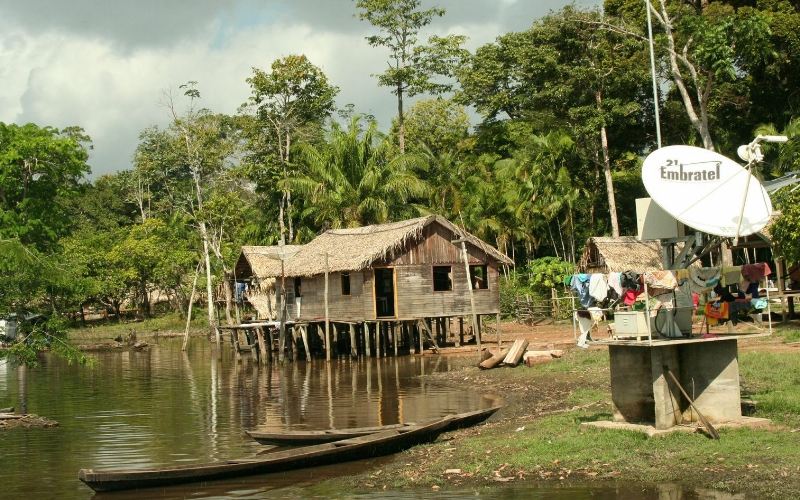FAIRFISH: Hidden Hunger, Forgotten Food
Researchers: Christina Hicks, Eva Maire, Antonio Alegretti
Funder: European Research Council
Fish are particularly high in many micronutrients essential to human health, but a systematic understanding of which species have the greatest concentrations of key nutrients, and barriers to access, are hindering their use in food security policy. This project is establishing the ecological and environmental determinants of nutrients in fish and uncovering the social practices, power, and institutions that mediate access to fish by the most vulnerable.
Find out more: https://lec-reefs.org/
Restoring African degraded landscapes with plant biodiversity and livestock management (ReDEAL)
Researchers: Mariana Rufino, John Quinton, Janine Morley, Gabriel Yesuf, Carmen Medina-Carmona
Funder: Biotechnology and Biological Sciences Research Council (BBSRC)
ReDEAL aims to reverse degradation trends in grasslands of sub-Saharan Africa by exploiting plant biodiversity and livestock management. The project seeks to integrate quantitative modelling techniques, field and laboratory measurements as well as household surveys to assess the potential for rapid restoration of soil functioning to support plant production for grazing livestock in smallholder production farms.
Find out more: http://wp.lancs.ac.uk/restoringafricangrazing/
Conservation Litigation
Researcher: Jacob Phelps
Funder: UK Government through the Illegal Wildlife Trade Challenge Fund
Conservation litigation uses liability lawsuits to demand that those who harm biodiversity be held responsible for providing remedies to fix that harm. In many countries, existing laws would allow for such conservation lawsuits, but they are not being used yet; our team of conservationists, lawyers, and economists is working to change that.
Find out more: https://www.conservation-litigation.org/
Implications of nutrient flow and feedbacks across the seabird-island-reef system
Researchers: Nick Graham, Casey Benkwitt
Funder: Bertarelli Foundation
Summary: In the absence of invasive rats, tropical islands can host abundant seabird colonies that transfer large quantities of nutrients from the open ocean to the island ecosystem and surrounding marine environment. This project seeks to quantify the importance of seabird nutrient subsidies to nutrient cycling and effects on island ecosystems, coral reef ecology, and coral reef geomorphology, and the feedback loop through this system.
Find out more: https://lec-reefs.org/
The response of foliar traits and phosphorus fractions to fertilization in tropical forests: Understanding plant acclimation to phosphorus limitation
Researchers: Emma Sayer, Faming Wang
Funder: Royal Society - Newton Mobility Grant and National Natural Science Foundation of China
We are comparing tropical tree responses to long-term nutrient additions on two continents, to advance understanding of how tropical forests maintain productivity on phosphorus-poor soils. To determine the physiological and ecological adaptation mechanisms of tropical trees to phosphorus limitation, we are studying how trees allocate phosphorus (P) to different structures and processes and determining how the differences in phosphorus allocation are linked to photosynthesis and growth.
Food insecurity and environmental risks in low- and middle-income countries
Researchers: Jasmine Fledderjohann (Sociology Department) and Luke Parry (LEC)
Funder: The Food and Agriculture Organization (FAO) of the United Nations
Food insecurity has far-reaching implications in terms of wellbeing across the life course and the inter-generational transmission of poverty and therefore represents an exigent challenge that must be addressed to promote sustainable and equitable economic growth. In this project, we are drawing on the Gallup World Poll individual and sub-national area data to understand both within- and between-country associations between physical and political-economic environmental factors and food insecurity.
Frightened fish and dark diversity in the Covid-driven anthropause
Researchers: Sally Keith, Lisa Bostrom-Einarsson
Funder: Natural Environment Research Council (NERC)
We are exploring how the reduction of divers in the water as a result of the Covid-19 anthropause can shed light on mechanisms that underlie reef fish behaviour, and its potential impacts on wider coral reef function.
Find out more: https://lec-reefs.org/
Bioclimate: biodiversity responses to climate land-uses change in tropical forest ecosystems
Researchers: Jos Barlow, Filipe Franca, Erika Berenguer
Funder: Foundation BNP Paribas
BIOCLIMATE examines these climatic and local stressors to tropical forests by monitoring the climate resilience of human-modified forests, developing new methods to quantify changes in tropical forest fauna and their trophic interactions, and examining the role played by fauna biodiversity in forest recovery. The project is in partnership with Manchester Metropolitan University, the University of Oxford, the Brazilian Agricultural Research Corporation and the French Museum of Natural History.
Socio-ecological resilience, territory and conflict in Western Pará, Brazilian Amazonia
Researcher: James Fraser
Funder: CNPq / British Academy
Based at the Federal University of Pará, Brazil
This project, with Mauricio Torres of the Federal University of Para, Brazil, is assisting the Saterê-Mawé indigenous people and traditional communities in obtaining territorial recognition and in resisting threats from loggers and land-grabbers in the Mamuru River valley, Brazilian Amazonia.





800x500.jpg)










